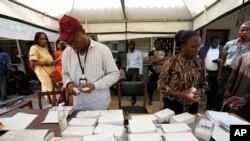Anambra police spokesman Ikenga Tochukwu said Wednesday's gunmen, armed also with improvised explosives and petrol bombs, invaded the Independent National Electoral Commission [INEC] office in Anambra state, the police station and the residential building in the station.
He said a boy was killed and a girl injured in the assault.
The attack on Wednesday on the Idemili office of the INEC was the latest attack on electoral authorities in the lead up to the February 25 election.
"The building was substantially damaged. All furniture and other items were destroyed, including non-sensitive materials recently delivered in readiness for the 2023 General Election," INEC's national spokesman Festus Okoye said in a statement late Wednesday.
He said among the items lost were 729 ballot boxes, 243 voting cubicles and 256 election bags.
Okoye said voters cards yet to be collected by their owners for the ballot were not affected by the fire.
"The destruction appears to have been coordinated as the Mobile Police Station in the LGA (local government area) was similarly attacked," he added.
Since it emerged from military rule in 1999, elections in Africa's most populous nation have often been marred by violence, claims of vote-rigging and logistical problems.
INEC has expressed concerns over repeated attacks on its facilities, fearing they may jeopardise the election, though INEC's chairman Mahmood Yakubu has said the upcoming ballot will go ahead as planned and without delays.
But Yakubu said this week there were some concerns about recent gasoline shortages affecting logistics on election day. INEC met with the NNPC state oil company to discuss how to manage any scarcity.
"The truth is our arrangements may be negatively affected by the non-availability of products," he told reporters.
Insecurity is a major issue in the campaign for the vote to succeed President Muhammadu Buhari, a former army commander who is stepping down after two terms allowed in the constitution.
- Separatist tensions -
Violence in southeast Nigeria is often blamed on the separatist militant group Indigenous People of Biafra (IPOB) and its armed wing, the Eastern Security Network.
IPOB, which agitates for a separate state for ethnic Igbo people in the southeast, has repeatedly denied any responsibility for the violence.
Separatism is sensitive in Nigeria, where a 1967 call for an independent Republic of Biafra in the southeast by Igbo army officers sparked a three-year civil war that left more than one million people dead.
Scores of police and other security personnel have been killed in southeastern states since the beginning of last year in targeted attacks, according to local media tallies.
Insecurity is a major issue in the campaign for the vote to succeed President Muhammadu Buhari, a former army commander who is stepping down after two terms allowed in the constitution.
Nigeria's armed forces are also battling on several other fronts: jihadists are fighting a 13-year war in the country's northeast, while heavily armed criminal gangs carry out mass kidnappings and looting raids in the rural northwest.




